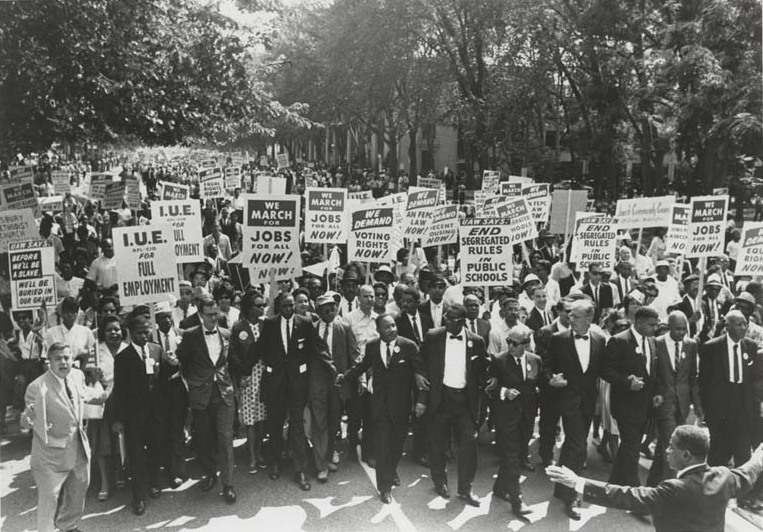Opinion | Juneteenth represents continued struggle for Black freedom
Demonstrators, led by Martin Luther King Jr, participate in the March on Washington for Jobs and Freedom on Aug. 28, 1963.
Jun 19, 2020
Being Black in America almost renders one to near insanity.
We see their faces, we hear their pain. George Floyd, Breonna Taylor, Trayvon Martin, Philando Castile, Eric Garner, Laquan McDonald, Alton Sterling and so many more.
One hundred fifty-five years to the day that slaves in Texas were freed, Black people continue to wrestle ghosts of the past. We continue to stand in the shadows of fear and terror. The psychological warfare that grips the collective consciousness of African Americans is all too real, all too familiar.
As we commemorate this holiday, one thing that has weighed on my mind is the word “progress.” Yes, since 1865 African Americans in the United States have made tremendous progress.
We’ve had Black politicians, athletes, entertainers, lawyers, engineers, doctors and academics make vital contributions to both our culture and society at large. Through these avenues we embrace our pride, our heritage and our talents. Barack Obama, Michael Jordan, Oprah Winfrey, Denzel Washington, Lebron James, Jay-Z, the Williams sisters, Mae Jemison, Eric Holder and so many more embody this reality.
Get The Daily Illini in your inbox!
Thus, the question I ask is why? Why do we continue to find themselves at the mercy of a vicious and tyrannical justice system in which police officers are able to kill us with impunity?
There is one obvious answer. As slavery showed us, Black life is valued very little. We were at one time considered property. We were not seen as human, only items to be disposed of at will. This explains the raping, murder and pillaging of innocent Black men, women and children.
Although we are long from the days of slavery, the mindset which existed then unfortunately persists in our modern era. Despite the accomplishments of African Americans, we continue to be disrespected, stereotyped and ignored. It explains why Derek Chauvin was seemingly content with inflicting pain on George Floyd. The devaluing of Black life is commonplace.
The mere recognition of racism is enough for white conservative commentators and their associates to downplay the very real trauma that Black communities continue to face. I cannot underestimate my internal caution as I walk past police officers. It’s as if my own soul has been compromised by fear.
Juneteenth is celebrated as one more chapter in the long struggle towards freedom. Following Juneteenth came the ratification of the 13th Amendment in December 1865, which formally ended slavery. One step forward and ten steps back would be the perfect description of our history. What seemed as an opportunity to escape the mental and physical prisons put upon us would later re-emerge as an even deadlier, more sinister plot to keep us “in our place”.
Reconstruction and the introduction of Black codes would become the norm. Efforts at imprisoning large numbers of African Americans for petty crimes would be successful. Slavery never ended, it just took on a new role.
So, we arrive back at square one. Slavery may no longer be legal, but the institutions which govern society have made it virtually impossible for African Americans to fully flourish and thrive.
As America transitioned into the 20th century, the Civil Rights Movement would swell. Activists would fight against segregation, while both Malcom X and Martin Luther King Jr. would serve as the two foremost popular figureheads in our community. Signature civil rights legislation had been passed in the 1960s signaling change in the nation. We had made progress, inching ever so close to the American Dream, which for many of us had been just a fantasy.
As time would go on, we became faced with the reality that these barriers to our civil liberties and human rights remained. No matter the accolades, no matter the celebrity, our justice remains denied. Juneteenth serves as an important reminder of the hope and aspirations for Black people.
We dream of an America where our skin color does not equal a death sentence. We remain hopeful that we are defined by our character and not by our skin color as eloquently stated by Dr. King. African Americans have remained steadfast in America for centuries. We have always been loyal to her, even though she has not always been loyal to us. We fought wars for her, although upon returning home, found ourselves at war with her. As seen by recent protests, we seek with vigor, true freedom and true racial harmony.
I think about Juneteenth and what it means to me. I think of those once living freed slaves on June 19, 1865, and how they felt knowing freedom was approaching. It makes me think of my own family.
My great grandmother, born in Mississippi, had a son who was murdered by the Klu Klux Klan. His body was found in a small pond. A family friend once recollected being spat on and having rocks thrown at him by white children as he walked to school. I look at myself and realize that I am now carrying on their memory, their fight and their struggle.
Juneteenth for me is more than a recognition of an event, more than simply a remembrance. It is an opportunity for me to recognize that I stand on the shoulder of giants and that it is not optional, but mandatory that I and my generation continue their fight for freedom.
Dennis is a senior in LAS.






